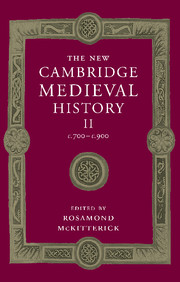Book contents
- Frontmatter
- PART I POLITICAL DEVELOPMENT
- PART II GOVERNMENT AND INSTITUTIONS
- PART III CHURCH AND SOCIETY
- 21 The papacy in the eighth and ninth centuries
- 22 The organisation, law and liturgy of the western church, 700–900
- 23 Carolingian monasticism: the power of prayer
- 24 Religion and lay society
- PART IV CULTURE AND INTELLECTUAL DEVELOPMENTS
- Conclusion
- Appendix genealogical tables
- List of primary sources
- Bibliography of secondary works arranged by chapter
- Index of manuscripts
- General index
- Frontispiece">
- Plate section
- Map 4 Charlemagne’s Europe and Byzantium, 814
- Map 19 The ecclesiastical provinces of western Europe 700-900
- Map 20 Carolingian schools, scriptoria and literary centres
- Genealogical table X: Wessex
- References
22 - The organisation, law and liturgy of the western church, 700–900
from PART III - CHURCH AND SOCIETY
Published online by Cambridge University Press: 28 March 2008
- Frontmatter
- PART I POLITICAL DEVELOPMENT
- PART II GOVERNMENT AND INSTITUTIONS
- PART III CHURCH AND SOCIETY
- 21 The papacy in the eighth and ninth centuries
- 22 The organisation, law and liturgy of the western church, 700–900
- 23 Carolingian monasticism: the power of prayer
- 24 Religion and lay society
- PART IV CULTURE AND INTELLECTUAL DEVELOPMENTS
- Conclusion
- Appendix genealogical tables
- List of primary sources
- Bibliography of secondary works arranged by chapter
- Index of manuscripts
- General index
- Frontispiece">
- Plate section
- Map 4 Charlemagne’s Europe and Byzantium, 814
- Map 19 The ecclesiastical provinces of western Europe 700-900
- Map 20 Carolingian schools, scriptoria and literary centres
- Genealogical table X: Wessex
- References
Summary
in the history of the western church the eighth and ninth centuries have generally been recognised as pivotal in the development of ecclesiastical organisation, canon law and the liturgy, and it is on these therefore that this chapter will concentrate. This was a period that saw the establishment of a dominant theory of episcopal primacy and of a hierarchy of clerical personnel; some of the purest texts of early Christian conciliar and papal law were collected and disseminated but there was also the concoction and wide distribution of some of the most audacious forgeries of these same two types of law. Both the genuine and the false came to influence the law of the church throughout the middle ages. Synodical legislative activity, which had virtually ceased in the late seventh century, was revived, to be supplemented by a host of episcopal and secular capitularies setting down legal norms intended to revitalise the church. It was in the late Merovingian and Carolingian periods, moreover, that in the liturgical rite of the western church Roman texts were mixed with earlier indigenous material, thereby creating a hybrid Roman rite that would be used in the worship of the western church down to the modern period.
Keywords
- Type
- Chapter
- Information
- The New Cambridge Medieval History , pp. 587 - 621Publisher: Cambridge University PressPrint publication year: 1995
References
- 8
- Cited by

